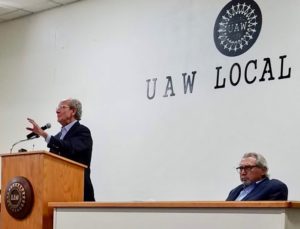By Tom Travis
The Flint City Council will vote Monday Dec. 14 on whether to accept a $20 million portion of the $641 million Flint water crisis settlement. That $20 million would come from the city’s insurance company. Because the City of Flint is named as a defendant in the water crisis settlement, the insurance company is offering this amount to the settlement.
The council questioned attorneys for both the defendants and plaintiffs in the $641 million settlement case during a four and a half hour special session conducted virtually Thursday, but took no action. All council members were present except Santino Guerra (3rd Ward).

Flint Water Crisis activists wearing shirts with “Flint is Still Broken” written on them at a June 2019 meeting at UAW local 659. (Photo by Tom Travis)
A preliminary approval hearing is scheduled for Dec 21 at 1:30 p.m. before Judge Judith Levy of the United States District Court for the Eastern District of Michigan.
The resolution the council will vote on Dec. 14 reads in part, “Lawsuits arising out of the City’s use of the Flint River from 2014-2015 have been filed in state and federal court, in which the City of Flint, former City officials, and/or City employees are among those named as defendants. Multiple other defendants have agreed to resolve, to the maximum extent possible, Flint Water Litigation claims against them, through a Settlement announced in August 2020…The City’s excess liability insurance carrier has agreed to provide $20 million as the City’s contribution to the Settlement, which will resolve Flint Water Litigation claims against the City, its former officials, and/or its former employees, at no cost to the city and its taxpayers.”
The resolution ends, “Although the City of Flint admits no liability, City Administrator Clyde Edwards and Law Department recommend using the funds provided by the City’s excess liability insurance carrier to settle the Flint Water Litigation cases.”
Additional amounts added to the settlement include: $20 million from the City of Flint’s insurance company and $20 million from McLaren Medical Center, and $1.25 million from Rowe Professional Services who provided the city’s engineering services between 2002 and 2016. McLaren executives deny claims that they were a source of the outbreak of Legionnaires disease which sickened 90 and took at least 11 lives in 2014 and 2015 and was linked by some sources to the tainted Flint water.
Present on the phone for Thursday’s meeting were the city’s legal counsel City Attorney Angela Wheeler and Assistant City Attorney Bill Kim, along with Rick Berg and Sheldon Klein. Also present were the plaintiff’s counsel Vinson Carter of the firm Robinson, Carter and Crawford, Corey Stern, a partner at Levy Konigsberg, LLP and Ted Leopold of Cohen Milstein Sellers & Toll. The council agreed to allow each council member ten minutes to ask questions of the attorneys.
What if the City of Flint decides not to settle?
Councilperson Monica Galloway (7th Ward) asked, “If the city decides not to settle the state will continue to settle and the city will be on their own, responsible for whatever came against them, is that what is being communicated?” Attorney Berg responded, “Yes.”
Genesee Towers settlement used as an example if City rejects settlement
Councilperson Galloway asked the attorney’s about an example they used in a previous meeting when one of the attorneys said, “if the city does not accept this settlement they run the risk of having additional lawsuits that could total millions and billions of dollars.”
Attorney Berg explained it’s “a simple mathematical thing. If we were to assume that each of the 2,700 children Mr. Stern represents and if all of them went to trial and all of them were given a judgement of $1 million dollars, that’s $2.7 billion. So it is theoretically possible if the city doesn’t settle and proceeds with litigation.”
Attorneys used Genesee Towers Settlement as an example of what could happen with the Water Crisis Settlement.
Berg explained, “The Genesee Towers was an $8 million settlement that caused the property owners to receive an increase of $150 on each of their taxes. If a city is unable to pay a judgement the law requires the city to assess a tax on all property owners. Berg said that if the city were to lose enough of these water crisis litigations it would have to do the same thing.”

City Council President Monica Galloway (7th Ward)
Attorney Berg replied, “That’s a very complex legal question that has been fought in a number of different battles throughout the four and half years this has been going on. The emergency manager law says that the city is responsible for the Emergency Manager and to defend them it’s kind of confusing because they’ve also been called upon to be state employees.
“But as far as on who’s behalf [the emergency managers] were acting [as the City of Flint or the State of Michigan] and the question, is will some of their actions cause the City of Flint to be liable or cause the State of Michigan be liable. Well some of that is still up in the air, it could go either way if it were to go to trial,” Attorney Berg said.
Statute of limitations effects children in lawsuits but not adults
Councilperson Jerri Winfrey-Carter (5th Ward) asked if a child finds out in five years that they have effects from the lead can they turn around and bring a lawsuit?

Councilperson Jerri Winfrey-Carter (5th Ward) in a City Council Committee meeting from November 2019. (Photo by Tom Travis)
Property damage claims from the water crisis
Councilperson Allan Griggs (8th Ward) asked what does a resident need to do to request reimbursement for a damaged hot water heater or other appliances?
Attorney Leopold, responsible for handling property damage claims, explained there is a preliminary approval hearing at 1:30 p.m. Dec 21. before Judge Judith Levy of the United States District Court for the Eastern District of Michigan.

Flint Water Class Action attorney Ted Leopold addresses the crowd; Co-leader Michael Pitt at right (Photo by Tom Travis)If the judge approves the case to move forward, registration forms will be made up and sent out to residents, businesses, and homeowners. Once the completed registration forms are returned that will begin the process to get reimbursement for property damage and then claimants will fill out a claims form.
Leopold also stated Judge Levy will grant a final approval of the settlement “around May or sometime like that.”
Council President Kate Fields (4th Ward) asked City Attorney Angela Wheeler “How much have we, the taxpayers paid, spent defending these lawsuits?”

Newly elected City Council President, Kate Fields (4th Ward) pictured in an early 2020 in-person City Council meeting. (Photo by Tom Travis)
“The residents of the City of Flint deserve justice….”
Flint Mayor Sheldon Neeley said in a statement on the city’s website, “While no amount of money will heal the wounds inflicted on this community, we are glad to see more entities step up and take responsibility,” Mayor Sheldon Neeley said. “The residents of the City of Flint deserve justice and they deserve a resolution to these lawsuits.”
Residents can find more information and answers to questions by visiting the Flint Water Crisis Settlement fact page.
EVM Managing Editor Tom Travis can be reached at tomntravis@gmail.com,


You must be logged in to post a comment.